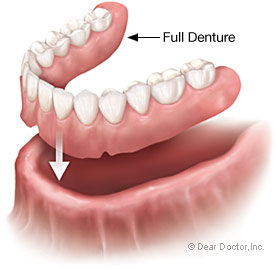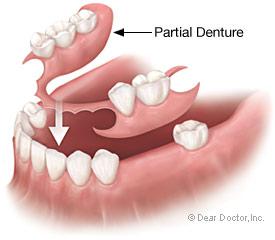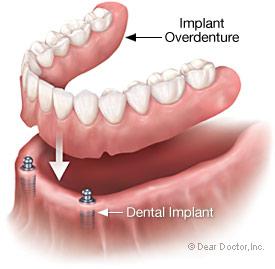Dentures
There are different kinds of dentures, but they all share a common function. They replace teeth that have become loose, or been lost due to bone loss. When bone loss around the roots of teeth is so great that it loosens them or can make them fall out, it’s time for dentures. Relax! No one enjoys losing their natural teeth, but with them you can still eat and talk as before.
In such cases, we examine the entire mouth and determine which teeth have to be removed, and which will remain. The loose teeth are then extracted. Dentures are fitted to go over, or around the remaining teeth. There is an adjustment period after dentures are placed in the mouth. You may take some time getting used to your new dentures. But once accustomed to the dentures, you can carry out all normal functions as before and your appearance does not change. Often implants can be used to stabilize the dentures further.
Complete Dentures

Complete dentures replace all of your teeth, or all of your upper or lower teeth. If all your teeth were missing, you’d probably consider complete dentures. There are two types of complete dentures: immediate and conventional.
Following tooth removal and before the permanent Conventional dentures are ready, you’d need what are called Immediate dentures. These are worn for some time until healing, following full tooth loss or extraction. While healing, your gums and jaws shrink, changing the shape of your mouth and hence the waiting period. Please note Immediate dentures require frequent visits to the Center for adjustment, until you’re fitted with Permanent dentures.
Partial Dentures
 Partial dentures are used to replace groups of teeth, or a few missing teeth from the lower or upper jaw.
Partial dentures are used to replace groups of teeth, or a few missing teeth from the lower or upper jaw.Over Dentures
 Over Dentures are an advanced alternative to dentures that combine traditional denture technology with modern advancements in dental implants.
Over Dentures are an advanced alternative to dentures that combine traditional denture technology with modern advancements in dental implants.
By establishing two implanted attachments to the lower jaw, an Over Denture sits securely in place, instantly increasing retention, stability, and comfort.
This is especially important in lower-jaw, full-denture situations, where traditional dentures tend to have less adhesion due to a limited foundation. The limited amount of bone loss where the implants are placed makes the procedure more successful in the long run, and helps preserve facial structural integrity. This is another benefit of Over Dentures, when compared to traditional dentures.
Even if you wear full dentures, you still have to practice good dental hygiene. Brush your gums, tongue and roof of your mouth every morning with a soft-bristled brush before you insert your dentures to stimulate circulation in your tissues and help remove plaque.
As is the case with your teeth, your dentures should also be brushed daily to remove food particles and plaque. Brushing also helps prevent teeth from staining.

